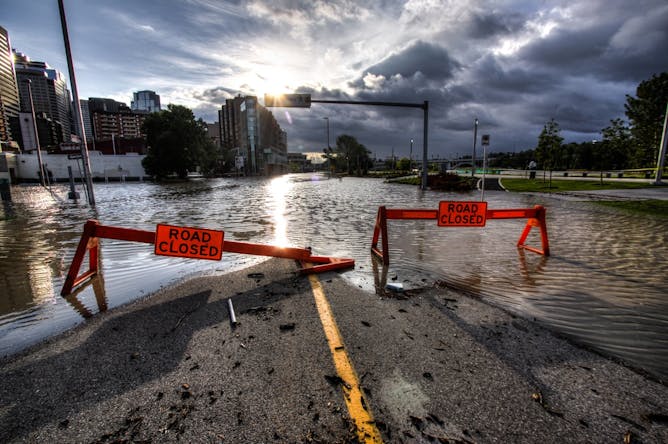|
It’s spring in Canada and that means it’s flood season – communities in New Brunswick and British Columbia continue to face rising waters this morning. Today in The Conversation Canada, Alexa Tanner and Scott McKenzie of the University of British Columbia look at the aftermath of two “100-year floods” that happened in Alberta within eight years of each other and how plans to mitigate future flood damage are still “reactionary and piecemeal.”
Kelly Toughill of the University of King’s College in Halifax has another part in her series on immigration in Atlantic Canada, this time looking at how newcomer entrepreneurs are making a difference in local economies.
There’s a long-forgotten monument in Canada’s largest cemetery and John Toohey of Concordia University tells the story behind the Montreal obelisk and how political rebels were treated like criminals.
And finally, Henry Giroux of McMaster University returns with a scathing look at critics of Donald Trump – such as Hillary Clinton and former secretary of state Madeleine Albright – who now conveniently ignore their own acts of authoritarianism when they were in positions of power.
Regards,
|

Heavy rainfall triggered extensive flooding across the province of Alberta in 2013.
(Ryan L. C. Quan/Wikimedia)
Alexa Tanner, University of British Columbia; Scott McKenzie, University of British Columbia
Calgary has already had two 100-year floods in less than a decade. But the city and the province have yet to take action to meaningfully lower the risk of future flood damages.
|

Suzanne Phillips and Adish Gebreselase are seen at Splitt Ends Unisex Hair Design, a storefront salon in Halifax that Phillips sold to the Eritrean immigrant last year.
(Kelly Toughill)
Kelly Toughill, University of King's College
Provincial governments in Atlantic Canada have been trying to encourage immigrants to become entrepreneurs for more than a decade. Some are boldly answering the call.
|

Battle of St. Eustache, December 14,1837: Rear view of St. Eustache church and scattering of insurgents during the 1837 rebellion in Saint-Eustache, a city in Québec. Ink and watercolor on paper.
Lord Charles Beauclerk/Library Archives of Canada
John Toohey, Concordia University
Why is a memorial to 29 Francophone men who were executed by the British government as well as to 58 men who were exiled to Australia in 1838 hidden away in a Montreal cemetery?
|

Hillary Clinton is seen in this February 2016 campaign event welcoming former Secretary of State Madeleine Albright onto the stage in New Hampshire during the Democratic primary. As both women condemn U.S. President Donald Trump for his creeping fascism, are they forgetting their own pasts?
(AP Photo/Jacquelyn Martin)
Henry Giroux, McMaster University
The likes of Madeleine Albright, Hillary Clinton and Michael Hayden are correctly issuing dire warnings about fascism under Trump. But what about their own actions?
|
Arts
|
-
Adam de Paor-Evans, University of Central Lancashire
A greater synergy between academics and practitioners is needed to progress hip hop for it to be taken seriously as a core area for study.
|
|
Environment + Energy
|
-
Donald Scavia, University of Michigan
Scientists have mapped a huge dead zone in the Gulf of Oman, without enough oxygen in the water to support life. This Speed Read explains why dead zones form in waters around the world.
|
|
Health + Medicine
|
-
Philip Clarke, University of Melbourne; An Tran-Duy, University of Melbourne; David Smerdon, The University of Queensland
Deaths of chess players led to alarm the game could cause fatal stress. some researchers have tested that theory.
|
|